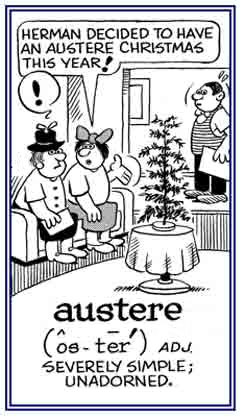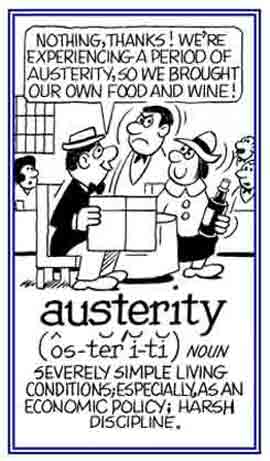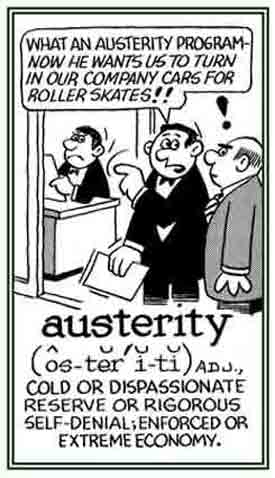auster-
(Greek: austeros, harsh, rough, bitter > Latin: dry, harsh, sour, tart)
"Spain is engulfed by a nationwide anti-austerity strike."
2. Imposing or suggesting physical hardship: In order to make a profit, many people are forced to work in more austere conditions by their employers in the manufacturing of products.
3. Grimly unsmiling, humorless, or suggesting strict self-denial; grave; sober; solemn; serious: Henry was an austere man with a rigidly strict lifestyle.
4. Severe in manner or appearance; uncompromising; strict; forbidding: Conditions in the prison were unbelievably austere.
Some austere people are very self-controlled and serious or even sad and gloomy.
Faces, manners, ways of life, and art forms are all subject to being described as austere, in order to portray the idea of severe simplicity, the absence of adornment; and in context, any restrictive sternness.
5. Rigorously self-disciplined and severely moral; ascetic; abstinent: They live an austere quality of life in the convent.6. Plain and simple; unadorned, without luxury, ease, or self-indulgence: Our ancestors lived an austere life on the frontier.
The cathedral was impressive with its austere simplicity.
Clara's austere apparel enhanced her natural beauty.
7. Severely plain in design or lines, without distractions or decoration: The company chose austere furnishings for the offices and other work areas.8. Rough to the taste; sour or harsh in flavor: Some people have austere diets that others cannot tolerate.
9. Etymology: from Latin austerus, "dry, harsh, sour, tart"; from Greek austeros, "bitter, harsh"; especially, "making the tongue dry".
Originally a reference to fruits, wines, etc., related to auos, "dry".

Go to this Word A Day Revisited Index
for a list of additional Mickey Bach illustrations.
2. Severely; rigidly; harshly: "After the tornadoes, people are austerely existing in shelters."
2. Harsh; unnecessarily extreme: "The austereness of the flooding is proving to be difficult to live with."
2. Usually ascetic or religious practices: They existed in the austerities of monastery life.
3. The trait of great self-denial; especially, refraining from worldly pleasures: Their self-imposed austerities restricted them from what most people consider to be simple pleasures of life.
4. Difficult economic conditions that are created by government measures to reduce a budget deficit; especially, by reducing public expenditures: Greece, Ireland, Portugal, Iceland, and other countries are required to develop austerities in order to qualify for monetary loans.
The citizens may have to endure years of austerities that will be placed on them by their governments.
The noun austerity is often heard in the news these days when some heads of state warn their people to be prepared to face "a period of austerity" as a result of economic crises.
Some Greeks have said that it is about time that the public sector trade unions also experience austerity because they have traditionally enjoyed generous benefits while the rest of the general population has "suffered" economically.
There is an air of inevitability about the upcoming austerity in Spain, to be outlined in the conservative government’s first full-year budget. Too much austerity could be self-defeating and even unrealistic, but Prime Minister Mariano Rajoy doesn’t have much of a choice.
Sticking to austerity at all costs may even be self-defeating if it sends the economy into a tailspin.

Go to this Word A Day Revisited Index
for a list of additional Mickey Bach illustrations.
Austerity policies are resulting in several countries with tightened or stringent economies; for example, when governments are forced to increase taxes, freeze wages, and when there are reductions in retirement payments and welfare services.

Go to this Word A Day Revisited Index
for a list of additional Mickey Bach illustrations.
"Some austerity measures affect development projects, welfare, and other social spending; all of which are common programs that are targeted for cuts."
"Portuguese police have attacked the demonstrators who were protesting nationwide against the government's austerity measures."
"Spain is taking drastic actions with an austerity plan to lower its debts, even during a recession which has seen unemployment expand to nearly one in four."
